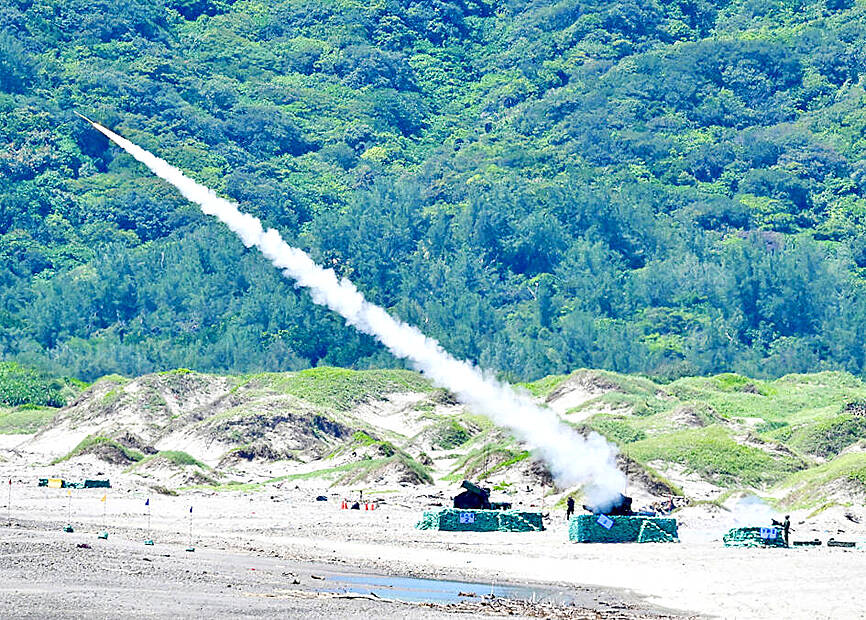Taiwan hopes to increase the number of Stinger missiles being obtained via US arms sales almost fivefold from 500 systems to 2,485, the Ministry of National Defense told lawmakers in a budget report.
The army would take over the Stinger program from the navy and change the order to add 1,985 missiles and 549 gripstock-control groups, as well as identification friend or foe (IFF) transponders, the ministry said in the document filed to the legislature last week.
Delivery of the missiles was scheduled to be completed in 2031, it said.

Photo: Lo Pei-te, Taipei Times
The budget allotted to the program would increase to NT$69 billion (US$2.16 billion) from NT$13.37 billion, it said.
The US has authorized the changes to the deal, the ministry added.
The ministry said it initially planned to buy 250 missiles, 108 gripstocks and 108 IFF transponders for the army, and 250 missiles, 70 gripstocks and 62 transponders for the navy. The navy later added 45 missiles, 15 gripstocks and 15 transponders to its order. Whether the revised deal includes the navy’s addition was unknown.
A defense official said on condition of anonymity that the ministry increased the order to deal with a rise in tensions across the Taiwan Strait.
The incursions into Taiwan’s air defense identification zone by the Chinese military show that ground forces urgently need to boost their air defense capabilities against aircraft and drones, the official said.
The FIM-92 Stinger, a short-range surface-to-air missile with a range of 4,800m, is typically operated by a crew of two, but can be fired by a single operator.
The first batch of Stinger missiles — to be delivered next year — would go to army and marine units, military police guarding Taipei, navy ships and coast guard garrisons in the Pratas Islands (Dongsha Islands, 東沙群島) and Spratly Islands (Nansha Islands, 南沙群島), the ministry said.
The second batch to be delivered by 2031 would be held in reserve, it added.
Separately, the ministry said in the budget report that the air force next year is expected to spend a record NT$43.7 billion on maintenance and repairs to sustain its aircraft and facilities.
The sum would be a 16 percent increase compared with NT$36.8 billion this year and a 50 percent increase compared with last year, the report said.
Next year’s budget includes a NT$23.7 billion component to obtain spare parts for aircraft from fighter jets to cargo planes, as well as ground equipment, and NT$20 billion for maintenance and repair, it said.
Air force expenditure to maintain weapons systems and facilities have increased 224 percent in the past eight years.
Beijing’s military flights around Taiwan began when Tsai Ing-wen (蔡英文) was elected president in 2016 and escalated after then-US House of Representatives speaker Nancy Pelosi visited Taipei in 2022.
Tasked with monitoring and intercepting Chinese aircraft, the air force has been increasing spending on airframe maintenance and placed an order for 66 Lockheed-Martin F-16V jets and parts, which the US is expected to deliver in full by 2026.

DAREDEVIL: Honnold said it had always been a dream of his to climb Taipei 101, while a Netflix producer said the skyscraper was ‘a real icon of this country’ US climber Alex Honnold yesterday took on Taiwan’s tallest building, becoming the first person to scale Taipei 101 without a rope, harness or safety net. Hundreds of spectators gathered at the base of the 101-story skyscraper to watch Honnold, 40, embark on his daredevil feat, which was also broadcast live on Netflix. Dressed in a red T-shirt and yellow custom-made climbing shoes, Honnold swiftly moved up the southeast face of the glass and steel building. At one point, he stepped onto a platform midway up to wave down at fans and onlookers who were taking photos. People watching from inside

A Vietnamese migrant worker yesterday won NT$12 million (US$379,627) on a Lunar New Year scratch card in Kaohsiung as part of Taiwan Lottery Co’s (台灣彩券) “NT$12 Million Grand Fortune” (1200萬大吉利) game. The man was the first top-prize winner of the new game launched on Jan. 6 to mark the Lunar New Year. Three Vietnamese migrant workers visited a Taiwan Lottery shop on Xinyue Street in Kaohsiung’s Gangshan District (崗山), a store representative said. The player bought multiple tickets and, after winning nothing, held the final lottery ticket in one hand and rubbed the store’s statue of the Maitreya Buddha’s belly with the other,

‘NATO-PLUS’: ‘Our strategic partners in the Indo-Pacific are facing increasing aggression by the Chinese Communist Party,’ US Representative Rob Wittman said The US House of Representatives on Monday released its version of the Consolidated Appropriations Act, which includes US$1.15 billion to support security cooperation with Taiwan. The omnibus act, covering US$1.2 trillion of spending, allocates US$1 billion for the Taiwan Security Cooperation Initiative, as well as US$150 million for the replacement of defense articles and reimbursement of defense services provided to Taiwan. The fund allocations were based on the US National Defense Authorization Act for fiscal 2026 that was passed by the US Congress last month and authorized up to US$1 billion to the US Defense Security Cooperation Agency in support of the

HIGH-TECH DEAL: Chipmakers that expand in the US would be able to import up to 2.5 times their new capacity with no extra tariffs during an approved construction period Taiwan aims to build a “democratic” high-tech supply chain with the US and form a strategic artificial intelligence (AI) partnership under the new tariffs deal it sealed with Washington last week, Taipei’s top negotiator in the talks said yesterday. US President Donald Trump has pushed Taiwan, a major producer of semiconductors which runs a large trade surplus with the US, to invest more in the US, specifically in chips that power AI. Under the terms of the long-negotiated deal, chipmakers such as Taiwan Semiconductor Manufacturing Co (TSMC, 台積電) that expand US production would incur a lower tariff on semiconductors or related manufacturing